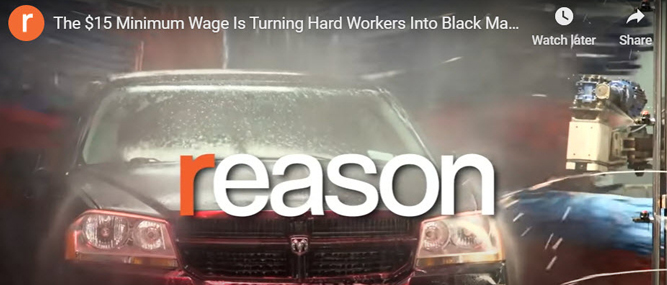Does the story of the car wash industry in New York City serve as an example for the rest of the country? It could hold the key to what will happen as more localities, states and even the federal government consider new $15 per hour minimum wage laws. After a lengthy showdown, higher wages will lead to shadow suppliers, more automation and decreased opportunities for low-skilled workers. All of this is taking place at a time where natural economic forces are pushes labor rates up across the country.
Reason magazine, which is published by a libertarian think tank, has produced an informative video about the ongoing saga between the car wash industry and labor interests. Progressive politicians, labor organizers, government prosecutors and others have pushed for reforms in the car wash sector since 2008 because it is known for employing low-skilled, frequently immigrant workers while paying less than minimum wage. The situations are similar in terms of the labor pool although pallet companies usually pay minimum wage or better to attract workers.
So, let’s explore the background of what took place to see if some similarities exist. The story begins with New York state investigators looking into the industry in 2008 with one of the city’s largest operators settling a case the next year. Then labor groups launched a campaign to unionize car wash workers in 2012. A push for higher wages led many carwashes in NYC to automate or shut down. The one area where machines do a very poor job is the interior of the car. A solution was to turn that part of the process into a do-it-yourself operation where the car wash provides free vacuum cleaners for customers to use. People who want the full service could pay for it. The few companies that did unionize struggled with rising costs.
Car washes that chose to automate benefited from rising minimum wages, which outlawed cheap labor. This made it more difficult for upstarts or labor-intensive washes to compete or undercut the market as prices rose. Union and labor efforts to protect workers backfired as many people lost their jobs. Some went to the black market where they worked out of vans parked on the street to offer “illegal” carwashes. These operators didn’t pay taxes, abide by regulations nor pay the minimum wage.
The reality is that people will find a way to work even if the law doesn’t allow it. And companies will opt for automation when labor becomes too expensive or difficult to find.
The most recent major state to enact new minimum wage laws is Florida. Voters in that state passed a new minimum wage amendment in November that will be gradually phased in until reaching $15 in 2026. Other states are likely to follow Florida’s lead. The reality is that higher wages are here to stay.
President-elect Joe Biden has promised to raise the federal minimum wage to $15 an hour. It has been $7.25 an hour since 2009. Florida, California, Connecticut, Illinois, Maryland, Virginia, Massachusetts, New Jersey and New York have all pledged to pay workers a minimum wage of $15 in the coming years. Other states have opposed labor efforts to raise wages fearing widespread job losses.
Currently, no state has an effective $15 minimum wage, but Washington D.C. does. Washington (state) has the highest state minimum wages at this moment at $13.50 per hour, according to the Department of Labor. For more information on your local laws, visit https://www.dol.gov/agencies/whd/minimum-wage/state.
Many pallet companies already pay a fairly competitive wage. According to the recent Human Resources and Wage Survey for the pallet sector conducted by Industrial Reporting Inc., the average rate for labor nationwide is $11.70 per hour. That rate is a national average for the cheapest worker a pallet company employs. And the going rate is well above the minimum wage in many states. Even though the industry pays competitive wages, the problem is that the industry will have to pay even more in the future. Minimum wage increases push up average salaries for lower-impact or entry-level jobs. Those mandated increases put upward pressure on other positions as well.
Pallet companies must develop a strategy to deal with skyrocketing payroll costs. Unfortunately, many companies have not done enough to pass along those costs. Smart pallet suppliers are having these discussions now with their customers to prepare them for the shock of higher pallet prices connected to burgeoning labor expenses.
From automation to labor surcharges to capping growth, pallet companies must grow within their means and ability to service customers. At the same time, pallet customers need to realize that for decades pallet costs have not kept up with the rate of inflation. Eventually something has to give.
Pallet company managers need to be developing a labor strategy now. Otherwise, they are going to find themselves priced out of the market facing the same fate as the car wash owners in NYC. Many car washes decided to close their doors. Owners opted to sell their property or rent it out for higher-margin tenants. Is that going to be the fate for many pallet companies crunched by rising labor costs? Somebody is going to make pallets. My bet is that the companies that survive will find a way to become more efficient while increasing prices.





